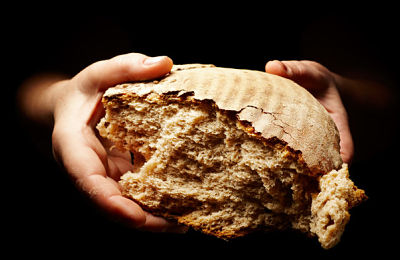Occasional Nibbles or Perpetual Feast?

Thirteenth Sunday After Pentecost
Few other Gospel texts capture the tension between Jesus’ accessibility and his acceptability. Jesus is easily accessible. He’s like the bread that came down from heaven, indiscriminately accessible to everyone. But he is not always easily acceptable — “and the bread that I will give…is my flesh.” When many of his disciples heard it, they said, "This teaching is difficult; who can accept it?”In the Gospel of John, it is common for people to misunderstand Jesus.
Jesus also has a tendency to lean into these misunderstandings. Many times his “clarifications” only serve to further muddy the waters for his listeners. Perhaps this is because some of his would-be followers are only desiring to nibble on the bread of life, while Jesus is inviting them to a feast. The New Oxford Dictionary defines food as “any nutritious substance that people eat or drink in order to maintain life and growth.” When I eat something, it becomes a part of me, and it enables me to live and move and have my being. Just as our bodies have a space and capacity to receive the life and vital nutrients of food, so too do our souls have a space and capacity to receive the life-sustaining love of God, which becomes a part of our lives. As Thomas Merton once noted, “the root of Christian love is not the will to love, but the faith that one is loved. The faith that one is loved by God.” And this love is offered to us as a love feast, not an appetizer or a supplement.
It is also worth noting that not all food is good. Much of my health comes as a direct by-product of what I eat. And the things that I perpetually eat will be transformed into the molecular structure of who I am. Literally every cell in my body comes from the food that I eat. The human body is a space of transformation. We take food into our being and it is transformed into our body’s material reality. Jesus is offering us nothing less than to consume divine food. When we take this food into our being, it has the potentiality to transform our material reality into something divine. We become partakers in God’s divine nature. “Thus he has given us, his precious and very great promises, so that through them you may escape from the corruption that is in the world because of lust, and may become participants in the divine nature.” (2 Peter 1:4)
While God has created us with the capacity to become divine by consuming the heavenly food of Christ, we also have the capacity to become vile by consuming the rancid feed of this world. We must remember we are going to become that which we continually take into our lives. The good news of Jesus Christ is that the same God-given capacity to become is what enables to receive the life-giving bread of God. But it doesn’t happen without cultivating a continual and constant hunger to take Christ into our lives. Christ embodies what it means to be human, and Christ himself is at the fulcrum of this transformation and becoming.
The Word becomes flesh. Through the power of this Word-become-flesh we see water become wine for the sake of a feast. We also see a few scarce loaves of bread become a feast to feed the multitudes. At Christ’s table we proclaim that just as water became wine, so now wine becomes blood, and bread becomes flesh. Christ invites us to this table of transformation and becoming. As we take take this reality onto our lips and into our lives, may almighty God transform our everyday lives into the body of Christ, and may Christ make of us an eternal offering to God.
